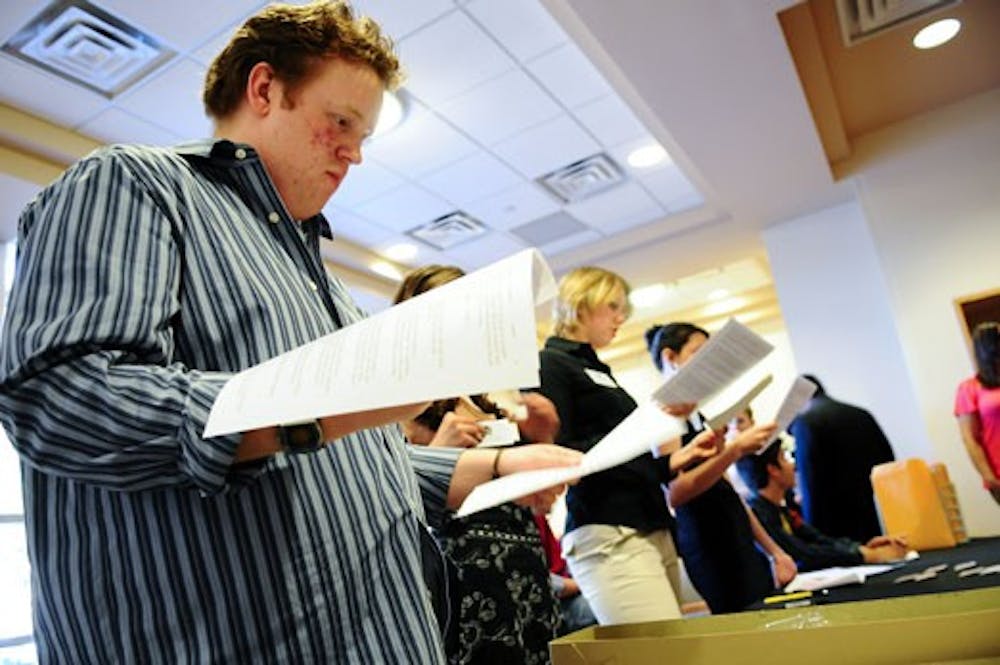Student Aaron Anderson was diagnosed with Asperger's syndrome, a form of autism, when he was 5.
"I suppose there was always the underlying sense that there seems to be something fundamentally different in me," Anderson said. "I always felt somewhat different from my peers."
Nicole Hudson, academic student success manager of Accessibility Services, said students with Asperger's tend to have above-average cognitive and verbal abilities but have impaired social skills.
"When they're socializing, they can't carry a conversation because they can't figure when to interject something or understand jokes," she said. "They often become loners and isolate themselves."
Hudson has worked with Anderson since he arrived at UNM three years ago. She said students have always been kind to Anderson.
"Definitely, throughout my time so far at the University here, pretty much every person I've come to be acquainted with has had that welcoming attitude and inclination towards unconditional help," he said.
Get content from The Daily Lobo delivered to your inbox
Monica Sandoval, events director of Community Experience, said she has worked with Anderson for three years.
"He's very kind-hearted and giving," Sandoval said. "He's always here when we need him."
Sandoval said Anderson is head volunteer of Community Experience and is responsible for organizing events and rallying other volunteers.
Anderson said living with Asperger's has not always been so easy. Middle school was the peak of his anti-social stage, he said.
"I sort of degenerated into a very defensive attitude," he said. "I had the biggest chip on my shoulder that anyone had ever seen."
Anderson said he tried to change his social behavior to meet the expectations of others.
Hudson said people who have Asperger's can be trained to act appropriately in social situations. Asperger's syndrome is a neuro-biological disorder, which means the brain does not entirely comprehend the situation, she said.
"People with Asperger's are very literal in their thought," Hudson said. "Basically, their brain just does not make that connection or pick up on the social cues. They can't read feelings or facial expressions and have trouble with idioms and slang."
Sandoval said she doesn't treat Anderson like he has a syndrome.
"I don't know how to explain it," Sandoval said. "We don't look at his disability as a problem - he's just extremely, extremely smart. I don't know anyone as smart as him, honestly."
Anderson said he is a member of the Phi Eta Sigma Honor Society and plans to get his Ph.D. in English from Stanford University.
Penny Anderson, Aaron's mother, said her son has always shown signs of high intelligence.
"He was reading the newspaper when he was 2 and finding errors in his textbooks in second grade," she said.
She said people with Asperger's need more opportunities to harness their abilities. She said many of her son's peers with Asperger's have not gone to college. Some are sitting at home playing video games - others are pushing carts at Wal-Mart, she said.
"You can be as smart as Einstein but can't get across the street," she said. "What good will that do you?"
Hudson said many students with Asperger's drop out of college.
"They do not have the needed social and communication skills to find their way through the college systems, like advisement, financial aid, activities on campus, talking with faculty and dorm living," she said.
Hudson said next year she will start a program for students with Asperger's that is aimed at helping them succeed. She said there are five students with Asperger's at UNM.
"We'll have workshops on organizing and planning, problem solving, communication skills, living in the dorms and resources on campus," she said. "There will also be close collaboration with faculty on best practices for accommodating and communicating with the students, as well as a parent support group."
Penny Anderson said her son has never wanted special treatment.
"I don't expect everyone to be educated on it, just have a little common courtesy and decency and compassion," she said. "There's just a lot where the doors are closed, and people aren't friendly. That's what I want people to know. I realize it's difficult for all of you. There's a whole lot of pressure on everyone - but just multiply that for people with disabilities."
Anderson said people who have a disability shouldn't be ashamed of it.
"It's not that you're a wrong version of what everybody wants," he said. "But you're a unique version, and people will want you because of that."






